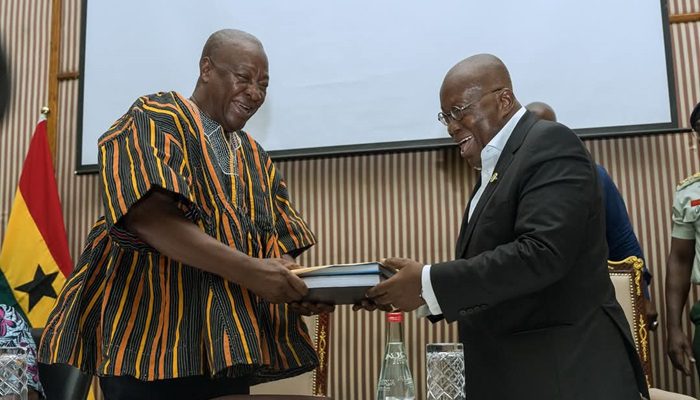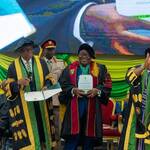The outgoing government’s Transition Team has called on the public to disregard claims suggesting that the committee has decided to refer all ongoing payments and recruitment processes to its authority.
According to the team, such assertions are baseless and do not reflect the decisions taken during its recent meeting.
Felix Kwakye Ofosu, spokesperson for the Transition Team of President-elect John Mahama, stated that the joint team had agreed all significant payments and recruitments should be submitted to them for consideration before implementation. However, a statement issued by Madam Fatimatu Abubakar, Spokesperson for the Transition Team, clarified that the team made no such resolution at its second meeting, held on December 13, 2024, at the Accra International Conference Centre.
The statement emphasized that any allegations of illegality regarding payments or recruitment should be brought before the Transition Committee for appropriate review and action.
All processes approved by statutory bodies
The statement affirmed that all recruitment and payment processes conducted by the outgoing administration had received approval from the relevant statutory bodies.
It noted there had been no evidence of illegality in these processes and assured the government would remain compliant with established protocols until the end of its mandate at midnight on January 6, 2025.
“Kindly disregard any statements purporting to indicate that the Committee has taken a decision to the effect that all ongoing payments and recruitment should be referred to the Transition Team, as same does not reflect the records of the meeting,” the statement urged.
Sub-committees to oversee transition
During the meeting, the Transition Team resolved to form six additional sub-committees to oversee various aspects of the transition process.
These committees will focus on Finance and Economy, Energy and Natural Resources, Legal and Governance, Infrastructure, Interior/Public Safety, and the Social Sector.
Each sub-committee will include three representatives from both the outgoing and incoming governments.
The Head of Civil Service, Head of Local Government Service, and Cabinet Secretary will also support the committees as needed.
Handing-over notes and immediate action
The Transition Team directed that handing-over notes from the outgoing government be delivered to the chairs of the sub-committees without delay to enable them to begin their work. Initial reports from the sub-committees are expected within one week.
Outgoing ministers, agency heads, and technical staff will also assist the sub-committees in clarifying details and providing further insights when sector-specific handing-over notes are being reviewed.
Commitment to a seamless transition
Reiterating its commitment to a smooth and lawful transition process, the team assured the public that it is working diligently to ensure a seamless transfer of power to the incoming administration on January 7, 2025.
The outgoing government reaffirmed its dedication to transparency and due process, dismissing any misinformation about irregularities.
This update highlights the outgoing administration’s focus on continuity and accountability during the transition period, underscoring its efforts to responsibly pass the baton to its successor.
Historical context of midnight actions
Midnight appointments remain a contentious issue worldwide, with most democracies implementing legal and procedural safeguards to maintain accountability and fairness during transitions.
In Ghana, with just a day to the end of his tenure in 2009, President Kufuor approved the Single Spine Salary Scheme, which increased public and civil sector salaries.
Similarly, after the 2016 elections, outgoing President Mahama engaged in a spree of midnight actions, including increasing allowances for national service personnel, making multiple appointments and recruitments, cutting sods for projects, and signing various contracts.
NDC appointees argued the president’s mandate remained in force until midnight on January 6.
An attempt to overturn some of these actions was filed by a member of the NPP, Patrick Buamah, with Lawyer Philip Addison as lead counsel.
These instances have fueled discussions about the need to regulate last-minute governmental decisions.
Recommendations for reform
The Presidential (Transition) Act (PTA) of 2012, which was enacted to enhance smooth presidential transitions, did not anticipate the increasing frequency of midnight actions.
Amending the Presidential (Transition) Act to address such practices would help curb last-minute decisions, ensure fair and transparent governance during transitions and reinforce public trust in the democratic process.
Global perspectives on midnight appointments
Midnight appointments, where outgoing leaders make last-minute decisions, are a global concern.
Many countries have established laws, conventions, or policies to limit such actions to ensure fairness, transparency, and smooth transitions.
United States
The Federal Vacancies Reform Act (1998) limits the ability of outgoing administrations to make last-minute appointments to vacant federal positions.
Appointments Clause of the U.S. Constitution provides guidance on who can appoint federal officers and the Senate’s role in confirmation.
Midnight Judges Act (1801)
Outgoing President John Adams made numerous judicial appointments under the Judiciary Act of 1801 to secure Federalist influence.
This led to the landmark Marbury v. Madison case, where the Supreme Court established the principle of judicial review. Midnight appointments are often scrutinized and sometimes overturned by incoming administrations or courts.
Presidents may issue executive orders or appointments, but these are subject to revocation by successors.
Certain appointments, such as federal judges, are harder to reverse due to lifetime tenure.
United Kingdom
The UK relies heavily on conventions and midnight appointments are considered improper and undermine democratic norms.
Outgoing governments generally avoid making significant appointments.
Exceptions, if made, often face public and parliamentary scrutiny. Ministers are expected to avoid actions that could tie the hands of the incoming administration.
Canada
Canada uses Caretaker Convention where during a transition, outgoing governments must avoid making decisions or appointments that would bind future administrations.
Controversial midnight appointments are rare due to strong adherence to conventions. If made, they can be reversed or reviewed by the incoming administration.
Australia
Australia uses Caretaker Conventions where during an election period or the caretaker phase (between the dissolution of Parliament and the swearing-in of a new government), governments are limited to routine decisions.
Appointments to major roles require bipartisan consultation.
The conventions are not legally binding but are adhered to strictly to maintain public trust.
Midnight appointments would likely lead to political backlash and potential reversal by the incoming government.
Kenya
Kenya’s 2010 Constitution emphasizes transparency and accountability in public service appointments.
Courts have invalidated appointments that violate due process or are made in bad faith this happened in 2021, when the courts nullified appointments made by President Uhuru Kenyatta on the grounds that they bypassed constitutional procedures.
South Africa
In South Africa Public Service Act of 1994 outlined the process for appointments and ensures fairness and transparency.
The judiciary ensures appointments follow due process and do not violate constitutional principles.
Midnight appointments are rare and often face judicial or public scrutiny.
Significant decisions during transitions are generally avoided.
By ELVIS DARKO, Accra
- Military service commanders sworn into Armed Forces Council - 25 April 2025
- Finance Minister unveils plan to tackle 2024 payables - 25 April 2025
- 2 potential flagbearers donate GH¢3m and GH¢1m to NPP - 25 April 2025




